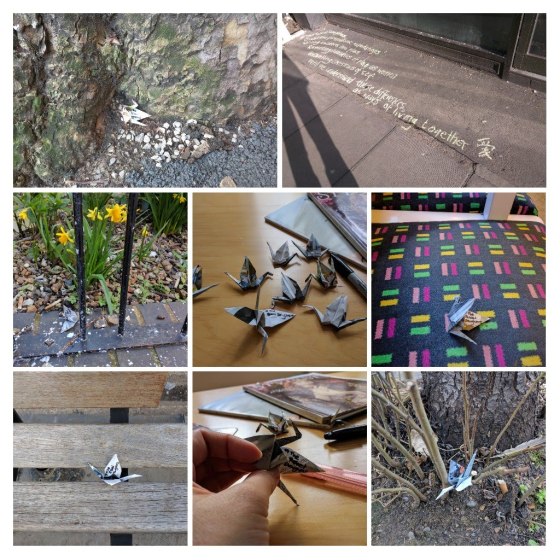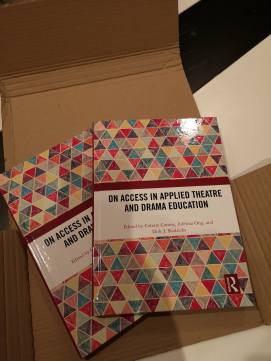
27.07.19
A Short Video Introduction to Compassionate Mobilities:
https://youtu.be/UbZc0vW4Fwg
Got the PhD certificate in the mail last Friday.
The PhD journey is officially done but the research journey is just beginning.
I’ve been thinking about creating a short video to explain what my PhD is about for a while…so this is a first attempt at introducing this emerging theory for negotiated living that I call Compassionate Mobilities. This is really scary for me. But if this experiment goes well, I’ll add to it and share more of the practice.
I’ve been working, as an applied performance practitioner, with young people from low-income families in Singapore since 2008. Most were/went to Normal stream and I’ve learned a lot from them about what it means to be Normal in Singapore where overachievement (Express) is the socially validated and expected norm. The urban art-inspired place practice that emerged from my research was shaped by the young people and the urban arts practitioners that I worked with in London and Singapore.
What I’ve held with me all through my PhD research (which started in 2014) is this: that it is only possible to build more compassionate futures when we attend to the hopes that young people who are marginalised hold for Singapore. This city is shaped by the relationships we nurture through our everyday interactions. The person that I am is shaped by the places I live in, by the city that I create through my interactions with others. I don’t want to live in a place defined by transactional interactions. And I doubt that the ethical obligations that emerge from living together in this shared place are sufficient for a compassionate imagination of the ‘we’.
Creating a more compassionate city means navigating the uncertain future together with those who have limited means of realising their hopes for themselves. Supporting the creation of alternative narratives of self-worth for those who have been unfairly described as inadequate or undeserving and deprived of the educational opportunities they need to realise their hopes for the future is perhaps one way of working towards compassionate mobilities for all.
Publications

20 November 2019
Routledge has turned ‘On Access’ into a book.
‘On Access’ was a special issue of Research in Drama Education, co-edited with Colette Conroy and Dirk Rodricks.
Here’s the abstract for the collection:
This book explores and interrogates access and diversity in applied theatre and drama education.
Access is persistently framed as a strategy to share power and to extend equality, but in the context of current and recent power struggles, it is also seen as a discourse that reinforces marginalisation and exclusion. The political bind of access is also a conceptual problem. It is impossible to refuse to engage in strategies to extend access to institutions, representations, buildings, education, discourse, etc. We cannot oppose access or strategies for access without reinforcing marginalisation and exclusion. We can’t not want access for ourselves or for others. However, we are then in danger of remaining immersed in a distribution of power that reinforces and naturalises inequality as difference. For applied theatre and drama education, the act of creating, teaching, and learning is intrinsically connected to choice, along with the agency and capacity to choose. What is less clear, and what still interests us, is how the distribution of power and representation creates the schema for an analysis of access and diversity.
2018
Editorial
https://www.tandfonline.com/eprint/AMwkGigzThH9VkHpzX85/full
One widely accepted narrative in Singapore concerns access and reads thus: education is the main vehicle for upward income mobility. Students are sorted into Normal and Express programmes through the Primary School Leaving Examinations at 12 years of age. Academic overachievement is the socially validated norm. Rising incidents of youth suicide and depression in recent years have been attributed to academic stress. I explore the messy temporalities of hope and propose that hope is created when imaginations of the future are not constrained by the parameters of access.
https://www.tandfonline.com/eprint/VJYkCKu2FPVAcuZwZxKn/full
Essai (French: `test’, `attempt’, `trial’, `tryout’):
Some people put up pictures of friends and loved ones on the walls of a new room as they settle into a place far away from home. For me, it was crawling on walls, vaulting over railings, falling slowly as I skated over little stones, that I stumbled into a relationship with London and deepened my relationship with Singapore.
This is an article I wrote for Theatre, Dance and Performance Training Journal on the relationship that I’ve developed with Singapore through urban arts-inspired place practices in London.
https://www.tandfonline.com/eprint/Zjq9yiQNqC7rCtfWKZvz/full
This article reflects on two performances of place involving graffiti and skateboarding: the first looks at a graffiti intervention by SKL0, an urban artist in Singapore, and the second examines the Long Live Southbank (LLSB) campaign to resist the relocation of Southbank’s Undercroft, an appropriated skate space in London. SKL0 and LLSB have galvanised significant public support, suggesting that it is possible to negotiate the aesthetics of a city (in the case of SKL0) and the visibility of (sub)cultures within publicly funded cultural institutions at Southbank Centre. Extending Michel de Certeau’s concept of walking as a speech act that articulates possible paths of movement across a landscape, the article suggests that these performances of place demonstrate the possibility of outcomes initially perceived as impossible.
Pushing Boarders 2019 talks released on YouTube: ‘University of Skate’ panel, Malmo, Sweden, https://youtu.be/V2PtBfpq8dw, 06.11.19 (accessed 6.12.19).
Jenkem (2019) ‘Looking Inside the World of Skate Academia’, Jenkem magazine, http://www.jenkemmag.com/home/2019/10/14/looking-inside-world-skate-academia/, 14.10.19 (accessed 6.12.19).
Willing, I. (2019) ‘The Evolution of Skateboarding and Why Pushing Boarders is a Sign of the Times’, Yeah Girl, https://yeahgirlmedia.com/the-evolution-of-skateboarding-and-why-pushing-boarders-is-a-sign-of-the-times/, 09.10.19 (accessed 6.12.19).
